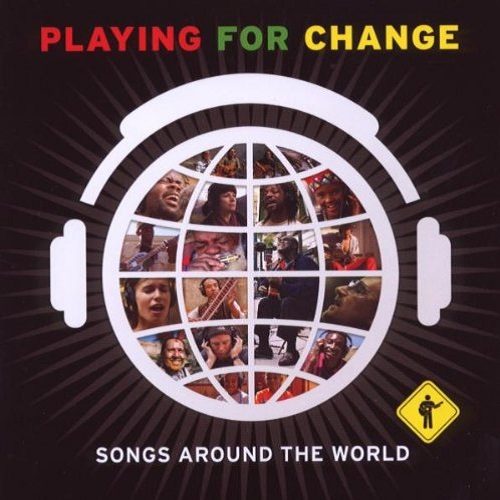“The act of playing music with people of different cultures, religions, economics and politics is a powerful statement. It shows that we can find ways of working together and sharing our experiences with one another in a positive way. Music has the power to break down the walls between cultures, to raise the level of human understanding.” That’s a quote from Mark Johnson, the founder of the Playing for Change Foundation. He started the foundation ten years ago after seeing two monks playing music at a subway in New York. A crowd of 200 people had stopped to watch the monks perform, and Johnson was struck by the powerful effect the music was having on the crowd and himself. He made it his mission to seek out unknown musicians with the goal of uniting people through music. This took him to South Africa, the Himalayas, Jerusalem, and post-Katrina New Orleans. This album collects ten songs and five videos.
Most of the tracks here were recorded by musicians in different parts of the world: a guitarist in France, a bassist in Nepal, a drummer in the Congo, a singer in Tel Aviv. The musicians are always recorded outdoors, and the videos of the all of the different participants are inspiring. The version of “One Love” here features bluesy guitar and vocals from Keb Mo, additional guitar from Manu Chao, a sitar solo, and African and Israeli vocalists. Even more impressive is the fact that it holds together as a song, despite being pieced together from performances by multiple musicians on four continents. Not all of the musicians are unknowns; along with Manu Chao and Keb Mo, Bono lends his voice to “War/No More Trouble.”
Bob Marley is an obvious choice to cover: he’s one of the most loved musician in the world, and his music was full of the same messages of peace and equality that Playing for Change promotes. It’s not all Bob on this compilation – there are some originals, along with a cover of “Stand By Me,” and the Indian folk song “Chanda Mama.” All of the tracks end up combining the influences of the various artists involved, and the result combines reggae, zydeco, Indian music, African music, and blues. The resulting mellow folky world music may not inspire RapReviews readers as much as the project itself. One exception is the Playing for Change Band’s take on Sam Cooke’s “A Change Is Gonna Come.” The original is heartbreaking in itself, but taken in the context of this project, and the aftermath of Hurricane Katrina, this version is even more moving. Despite the fact that I wasn’t feeling all of the music on this album, I still found “Playing for Change” an interesting document of a worthy project. One of the things I love about music is the way it can connect people from very different backgrounds, and the Playing for Change Foundation has done an excellent job of using music to prove that we humans are more similar than different. Even if the music isn’t your thing, check out their website at www.playingforchange.com to see what they are doing and how you can get involved.

